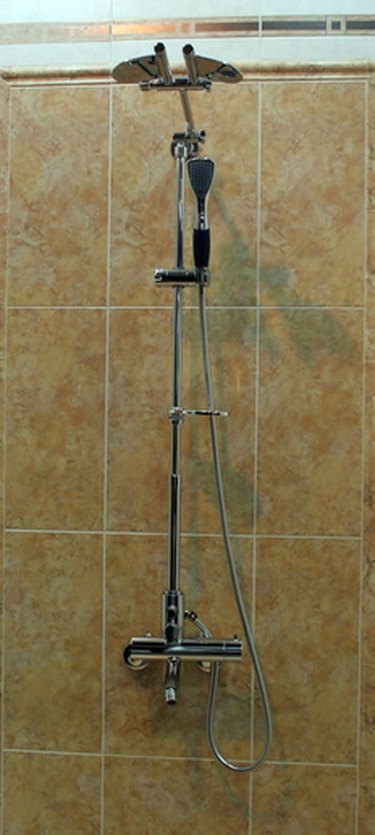Things You'll Need
Safety glasses
Work gloves
Pry bar
Screwdrivers
Utility knife
Jigsaw (optional)
Rag
Hammer
Chisel
Metal snips
Scraper

The task of removing a shower stall, especially a fiberglass or plastic shower stall, can be completed in a matter of hours. If your shower is old and ugly and needs an update to bring your bathroom into the 21st century, simply remove the old shower and install a replacement. If you wish to upgrade from a fiberglass or plastic shower to a tile shower, removing the old shower stall is part of the preparation process.
Removing Accessories
Step 1
Shut off the water supply.
Video of the Day
Step 2
Disconnect the faucet handles, the spout and the shower head. Remove the shower door or curtain rod, the molding or trim and any other accessories.
Step 3
Pry off the faucet covers and unscrew the mounting screws to remove them. Remove the shower head by unscrewing the collar nut—which sits just above the shower head—with a wrench.
Step 4
Loosen the escutcheon plate, the doughnut-shaped piece of metal that sits against the wall, and unscrew the arm by twisting it counterclockwise.
Removing the Stall
Step 1
Separate the shower panel from the wall. Begin by slicing the caulking with a utility knife all around the edge of the shower. Remove any screws that hold the panels together.
Step 2
Remove the panels from the wall. Slide the flat end of a pry bar between the panel and wall and pry the panel loose.
Step 3
Cut the panels into small pieces for easier disposal. Use a jigsaw or very sharp utility knife.
Removing the Base
Step 1
Slice the caulk between the base and the floor of a fiberglass or plastic base and unscrew any fasteners. Pry the base loose.
Step 2
Remove the drain strainer from a ceramic base and stuff a rag into the drain.
Step 3
Break through the tile on a ceramic base with a hammer and chisel to gain access to the layers underneath. Remove the tile.
Step 4
Cut through the steel mesh underneath the tile with metal snips. Remove the steel mesh.
Step 5
Scrape away the waterproofing layers with a scraper.
Video of the Day